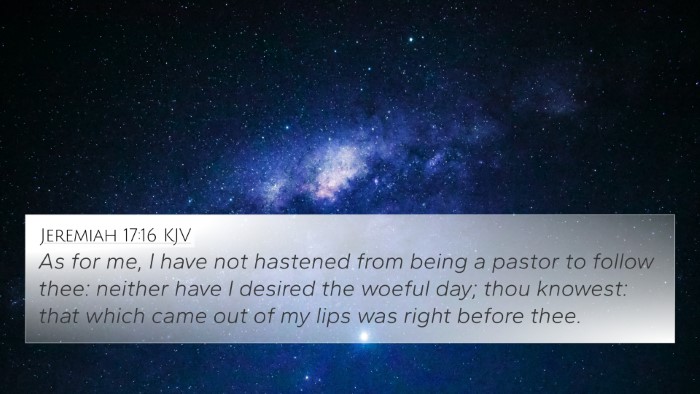Understanding Proverbs 12:20
Bible Verse: Proverbs 12:20 - "Deceit is in the heart of those who devise evil, but those who plan peace have joy."
Overview of the Verse Meaning
This verse contrasts two types of planning: those who plot evil and those who purpose peace. The underlying theme is the moral and emotional consequences of our intentions and actions.
Insights from Public Domain Commentaries
Matthew Henry's Commentary
According to Matthew Henry, this passage emphasizes the inward nature of deceit, suggesting that true intentions are revealed through one's actions. He notes that devising evil reflects a heart filled with malice and deception, while planning for peace results in genuine joy and satisfaction.
Albert Barnes' Notes on the Bible
Albert Barnes highlights that evil plans often lead to strife and sorrow for both the planner and those around them. In contrast, those who actively seek peace contribute to a harmonious environment. His analysis reminds readers that the fruits of our plans—their success or failure—are indicative of their nature.
Adam Clarke's Commentary
Adam Clarke emphasizes the futility of malice and the benefit of righteousness. He suggests that those who aspire for good and peace cultivate a fulfilling life, contrasted sharply with those immersed in treachery and scheming. Clarke's interpretation encourages embracing virtuous endeavors, which ultimately lead to joy.
Cross-References for Proverbs 12:20
- Proverbs 10:12: "Hatred stirs up strife, but love covers all offenses."
- Galatians 5:22-23: "But the fruit of the Spirit is love, joy, peace, patience, kindness, goodness, faithfulness, gentleness, self-control."
- James 3:18: "And the seed whose fruit is righteousness is sown in peace by those who make peace."
- Isaiah 26:3: "You keep him in perfect peace whose mind is stayed on you, because he trusts in you."
- Romans 8:6: "For to set the mind on the flesh is death, but to set the mind on the Spirit is life and peace."
- Proverbs 11:19: "Whoever is steadfast in righteousness will live, but he who pursues evil will die."
- Matthew 5:9: "Blessed are the peacemakers, for they shall be called sons of God."
- 2 Corinthians 13:11: "Finally, brothers, rejoice. Aim for restoration, comfort one another, agree with one another, live in peace; and the God of love and peace will be with you."
- Philippians 4:7: "And the peace of God, which surpasses all understanding, will guard your hearts and your minds in Christ Jesus."
- 1 Peter 3:11: "Let him turn away from evil and do good; let him seek peace and pursue it."
Thematic Connections
The themes present in Proverbs 12:20 link closely to fundamental Biblical concepts, such as the importance of purity of heart, the value of righteousness, and the pursuit of peace.
The Importance of Intentions
The implications of this verse emphasize that our internal motives ultimately shape our external experiences. The choice between evil and peace is not merely ethical; it deeply influences our emotional and spiritual lives.
Encouragement for Peaceful Living
Christians are called to live in peace, as shown in cross-references pertaining to peace-making and the fruits of the Spirit. The alignment of one's actions with divine love brings about true joy, in contrast to the destructive nature of deception and evil scheming.
Conclusion
Proverbs 12:20 serves as a powerful reminder about the heart's role in determining our lives' trajectory. As believers reflect on this verse, they are encouraged to choose paths of peace and joy over those of deceit and malice, ultimately fostering a life aligned with God’s will and purpose.
Further Study and Reflection
For those seeking to deepen their understanding of this verse through cross-referencing Biblical texts, various Bible references resources and tools for Bible cross-referencing can greatly assist in exploring interconnected themes throughout scripture.
Engaging in a cross-reference Bible study can illuminate the intricate ways God's word interacts with itself, enhancing one's spiritual journey and understanding of His teachings.













